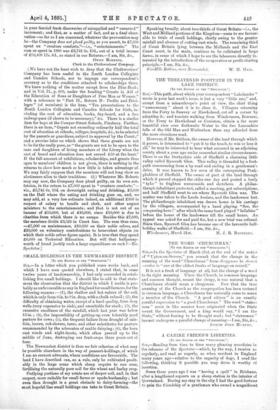SMALL HOLDINGS LN THE NEWMARKET DISTRICT. pro THE EDITOR OF
THE " SPECTATOR:1 S1R,—In a letter which you published some weeks back, and which I have seen quoted elsewhere, I stated that, in some ;twelve years of landownership, I had only succeeded in establishing five small holdings. I should like.to add to that statement the observation that the district in which I reside is probably as unfavourable as any in England for small farmers, for the following reasons :—(1), the shallow and hot nature of the soil, which is only from 6 in. to 9 in. deep, with a chalk subsoil ; (2), the difficulty of obtaining water, except of a hard quality, from deep wells (very expensive to sink), and unsuitable for stock ; (3), the excessive smallness of the rainfall, which last year was below .15 in. ; (4), the impossibility of getting-up even tolerably good .pasture for cows ; (5), the frequent failure from drought of sainfoin, lucern, red-clovers, tares, and other substitutes for pasture recommended by the advocates of arable dairying; (6), the keen east winds and night-frosts, which often prevail up to the middle of Jane, destroying our fruit-crops three years out of four.
The Newmarket district is thus no fair criterion of what may be possible elsewhere in the way of peasant-holdings, of which I am an earnest advocate, where conditions are favourable. The land I have described can, as a rule, only be cultivated profitably in the large areas which sheep require to runover, fertilising the naturally poor soil for the wheat and barley crop.
Outlying portions of my estate are of deeper soil, and, in that respect, more suitable for small farms or spade-husbandry ; but even then drought is a great obstacle to dairy-farming—the most hopefdl (line emall holdings can take in Great Britain. Speaking broadly, about two-thirds of Great Britain—i.e., the West and Midland portions of the Kingdom—seem to me favourable to trials of small holdings, chiefly owing to the greater rainfall and absence of cutting east winds. The remaining third of Great Britain lying between the Midlands and the East Coast must, in the main, continue to be cultivated in large farms, in some of which I hope to see the labourers directly interested by the introduction of the co-operative or profit-sharing principle.—I am, Sir, &c.,
Six-Mile Bottom, near Newmarket. W. H. HALL.


































 Previous page
Previous page